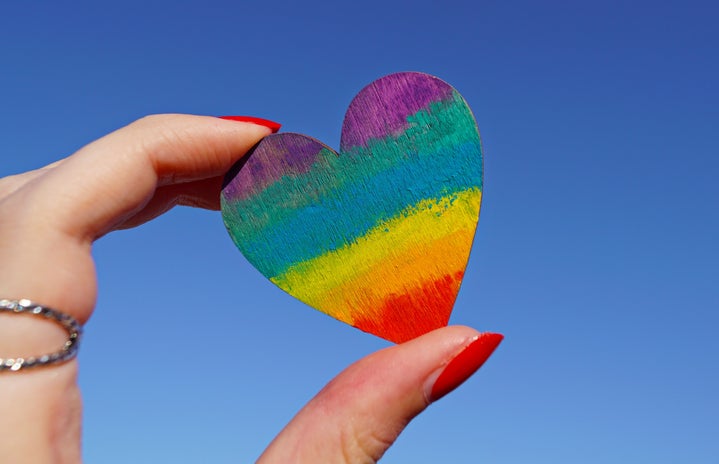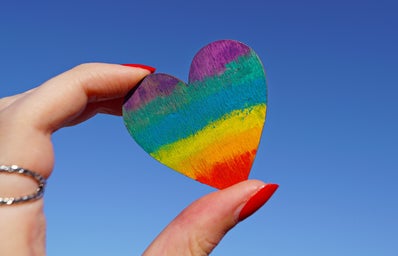“You’re, like, the straightest person I’ve ever met.” I used to feel like I was being stabbed every time she said it: my first girl crush, freshman year of high school. We were best friends at the time (and actually still are, she’s probably reading this with a smile on her face). From the brilliant blue streak in her pixie cut down to her scuffed Doc Martens, her physicality oozed comfort in her sexual identity. Her bedroom walls were plastered with images of her favorite gay icons and the bisexual pride flag; every shirt she owned had previously lived in a Hot Topic. Everything she was felt like a magnet for something I wasn’t ready to admit yet — pulling on my sexual insecurity with the strength and certainty of Earth’s gravity.
The same way her accusations of heterosexuality had stung, so had the countless contrary whispers thrown at me in childhood. My wandering eyes in gym locker rooms and anatomical inquiries invoked the same hushed response: “Maybe she’s one of those.” As early as my struggle to learn my ABCs, strangers (and loved ones) were making me an outsider for something I couldn’t begin to understand. All I knew was that some crucial part of me was wrong.

I talked of nothing but my desire to get a boyfriend between the ages of 11 and 16, or of the unattainable male celebrities and fictional love interests that populated young adult fiction. Even as I started seriously dating different boys throughout high school, I droned on and on about my boy-inclined lust. None of this is to say that any of those feeling were untrue — because I’ve never lied about how intensely my body aches for Andrew Garfield. I’d say my laser-like focus was at least partially fueled by my fear of landing on the same sex.
By my freshman year in college, I was more aware of my same-sex inclinations, mostly thanks to the spandex-clad cast of Netflix’s GLOW; I just still couldn’t believe it. I was the “straightest person” my gay friends had ever met! I couldn’t even picture myself actually dating another girl, let alone having sex with one. In my head, I still wasn’t “qualified” to be anything other than heterosexual. The hazy nights at college parties spent aching for another woman’s touch didn’t count. Changing my dating apps’ settings to include the same-sex meant nothing more than college experimentation.

But she was just one person. She couldn’t undo the years of childhood shame I had experienced, nor could she make my parents understand that their children could be anything other than heterosexual. On the night of what should have been our second date, I had a panic attack on the floor of my dorm room while my roommate sent her texts saying that I wouldn’t be able to see her again. She was already there, at the bookstore where we were supposed to meet. I stood her up because I was too afraid to stand up to myself.

Nothing has really changed about the way that I exist or present myself. I was already looking at girls with gay fascination and cuffing my jeans; shaking off my sexual stigma had just been the final step in understanding who I already was. None of my loved ones were especially surprised. The responses to my coming out ranged from hugs and praise to a simple (but loving), “Yeah, I figured.” It’s all finally real. It feels incredible.

If you’re scared, you’re not alone, and I can’t tell you that it won’t be hard. All I can tell you is that you don’t have to be who anyone else wants you to be: you just have to be yourself. That’s all that’s expected of us in this life. Once you embrace that, any obstacles you face will be nothing compared to the power that comes with freedom.


